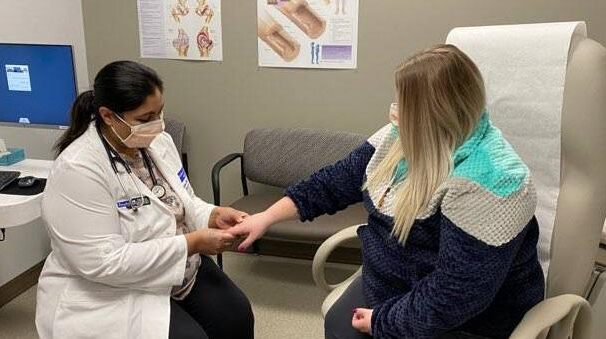Internal Medicine Healthcare Taxonomy Code 207RR0500X
HealthProviders DB is a comprehensive database of healthcare providers, including a complete directory of all Rheumatologists.
As of today, the following are the total number of Rheumatologists nationally, in your State, and near your location.
Select a State below to view the list by State. Additionally, you can narrow the list by city, among other options, from the Filter Panel, which you can open by clicking the vertical ellipses ⋮ in the upper right corner of the app.
Alaska – Alabama – Armed Forces Pacific – Arkansas – American Samoa – Arizona – California – Colorado – Connecticut – District of Columbia – Delaware – Florida – Federated States of Micronesia – Georgia – Guam – Hawaii – Iowa – Idaho – Illinois – Indiana – Kansas – Kentucky – Louisiana – Massachusetts – Maryland – Maine – Marshall Islands – Michigan – Minnesota – Missouri – Northern Mariana Islands – Mississippi – Montana – North Carolina – North Dakota – Nebraska – New Hampshire – New Jersey – New Mexico – Nevada – New York – Ohio – Oklahoma – Oregon – Pennsylvania – Puerto Rico – Palau – Rhode Island – South Carolina – South Dakota – Tennessee – Texas – Utah – Virginia – Virgin Islands – Vermont – Washington – Wisconsin – West Virginia – Wyoming
Medicare
The following are the total number of Rheumatologists who accept Medicare in your State, the number who have opted out of Medicare, and the total number excluded from participation in Medicare nationwide.
The diagram below shows all the Rheumatologists across the country, represented by blue bubbles. The larger the bubble, the greater the concentration of providers in that area. Red bubbles represent Medicare-excluded providers, with the larger bubbles indicating a higher percentage of excluded providers in that region. You can change the bubble size to be based on exclusions from the Size menu.
What do Rheumatologists do?
Rheumatology physicians, also known as rheumatologists, are medical doctors who diagnose and treat inflammatory and autoimmune conditions that affect the musculoskeletal system, including the joints, muscles, bones, and connective tissues.
They manage conditions like rheumatoid arthritis, osteoarthritis, lupus, and gout through non-surgical methods like medications, joint injections, and physical therapy.
What they do
Diagnose: They conduct physical exams, take medical histories, and use tests such as lab work and imaging (X-rays, MRIs) to identify rheumatic diseases.
Treat: They develop personalized treatment plans to manage symptoms, control inflammation, and slow disease progression.
Manage chronic conditions: They help patients live with lifelong conditions that cause persistent pain, swelling, and joint and muscle stiffness.
Conditions Rheumatologists Treat
Arthritis encompasses rheumatoid arthritis (an autoimmune condition) and osteoarthritis (a degenerative condition).
Autoimmune diseases, such as lupus, can affect multiple parts of the body, including joints, muscles, and organs.
Osteoporosis: A condition where bones become brittle.
Gout: A type of inflammatory arthritis caused by a buildup of uric acid.
Soft Tissue and Connective Tissue Disorders: Conditions like tendinitis, bursitis, and back pain.
When to see a Rheumatologist
You may be referred to a rheumatologist by your primary care doctor if you experience persistent pain, stiffness, or swelling in your joints that persists despite treatment. This could be a sign of an underlying autoimmune or inflammatory condition.

